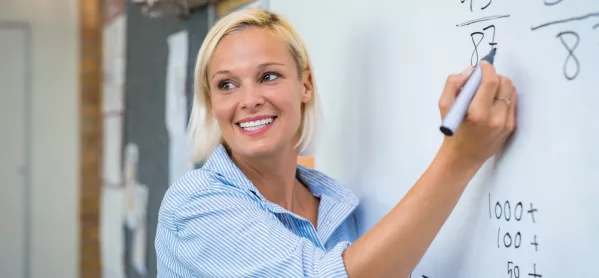The vast majority of teachers believe that the current maths GCSE is not fit for purpose, according to a snap poll by Tes.
The finding comes amid growing concerns that almost a third of pupils who sat the reformed qualification last year did not achieve a standard pass or better.
Worries about this "forgotten third" have led to calls for maths GCSE to be split into two separate qualifications, with one allowing pupils to demonstrate the mathematical skills they will need in adult life, and the other delving into the subject in more depth.
Exclusive: New GCSEs less accurate, teachers warn
GCSE results: Schools battle to help 'forgotten third'
Analysis: Is maths letting down the 'forgotten third'?
Heads: GCSEs 'rub pupils' noses in disappointment'
In a poll of teachers for the Shape the Agenda initiative on the Tes community website, which aims to give teachers a voice in policymaking, 81 per cent said GCSE maths was not fit for purpose.
Only 19 per cent of the 170 people who answered the question said it was fit for purpose.
Lucy Heller, chief executive of the Ark academy chain, told Tes: “It’s a terrible shame that we have roughly a third of students not reaching level 4 in maths, and I think that the current maths GCSE serves to put off and frighten those for whom maths may not be a natural subject, or who have been badly taught.
“At the most basic level, we really need every citizen to be functionally literate in maths, and having a significant proportion of people who go into adult life uncomfortable with numbers seems to me daft.”
Changing maths GCSE
Ms Heller said maths GCSE could become a double subject, with a similar split to that between English language and English literature.
She added: “You should be able to pass, and have something to show employers that you are functionally numerate without robbing anyone of the chance to go on to the pleasures of calculus, geometry and algebra, etc.”
One contributor to the Tes forum suggested a “dual system”, with a numeracy paper that is compulsory for all and demands a minimum level of understanding, and a mathematics paper for those who want to study the subject at more depth.
They added: “Those who are mathematically able can take numeracy earlier and then focus longer on mathematics if they wish or do them side by side. Those who need longer can focus on numeracy all the way to Year 11 without being distracted by the unnecessary topics.”
Another contributor wrote: “I have always thought that maths is a huge subject area with the possibility of being split into areas that are really needed in the ‘real world’ and those with more esoteric attractions.
“The weaker pupils need to be able pass an exam that can get them somewhere and will be useful. To struggle through some questions on algebra or trigonometry which will probably only give them one mark out of six seems pointless.”
A Department for Education spokesperson said: “Our current GCSE mathematics already includes two tiers to support pupils of all abilities, whether they are working towards grades 5-1 or the higher grades of 9–4.
“There is also the option for students who achieve a GCSE grade 2 or below to study maths functional skills at post-16, instead of retaking their GCSE.”




